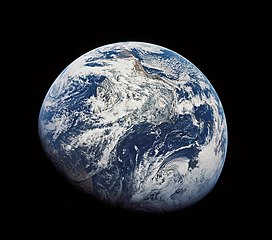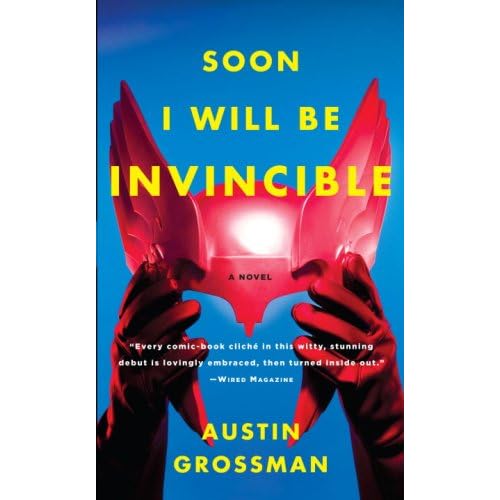With just one hand held up high
I can blot you out, out of sight.
Peek-a-boo, peek-a-boo, little Earth.
- Kate Bush, “Hello Earth”
I can blot you out, out of sight.
Peek-a-boo, peek-a-boo, little Earth.
- Kate Bush, “Hello Earth”
 In late December 1968, an astronaut on Apollo 8, Probably William Anders, became the first human to take a picture of the the earth in one frame. It wasn't the first photo to show the earth in one frame—unmanned satellites had created images at least two years earlier. Nor is this the iconic Blue Marble photo, which showed an entire illuminated face of the earth—that was taken four years later by Apollo 17. But I still like it, and tie it to the view of Earthrise from the Moon shown on the Apollo 8 commemorative stamp, which in turn ties to the reading from Genesis that was made by the crew on Christmas from the spacecraft.
In late December 1968, an astronaut on Apollo 8, Probably William Anders, became the first human to take a picture of the the earth in one frame. It wasn't the first photo to show the earth in one frame—unmanned satellites had created images at least two years earlier. Nor is this the iconic Blue Marble photo, which showed an entire illuminated face of the earth—that was taken four years later by Apollo 17. But I still like it, and tie it to the view of Earthrise from the Moon shown on the Apollo 8 commemorative stamp, which in turn ties to the reading from Genesis that was made by the crew on Christmas from the spacecraft.
The old spiritual goes "He's got the whole world in his hands" and when I heard Odetta sing that as a child, I thought of that new image of the world from space. It's become a cliche children learn from their youngest days: children entering the Barbara Petchenik Children's Map Competition often locate their version of the blue marble as an object of care, cared for by people... variants of the hands-around-the-world designs that in my growing up years symbolized the desire for world peace.
These derivative images, the logos and illustrations and photo-montages... they are all lies. Their intentions are good, and the message of an interconnected world, a world that can be polluted and made much less habitable by humans, has been a powerful one. But that picture of giant hands or giant people distorts the real scale of things. It makes it look like the planet could be crushed.
It's hard to visualize at the scale of a screen or a textbook page; even well-done, to-scale graphics still give the sense of a planet that can be held in hand, of a kind of fragility we could blot out with one mistake.
The planet, in fact, is staggeringly huge, especially compared to the way we commonly understand space directly, the way we make ourselves at home. There's a basic graphic in the Science Museum of Minnesota that brought this home to me last week: it shows a cross-section of a small arc of the Earth's surface, with the thin thin layer of atmosphere over the top. The distance from the top of Everest to the bottom of the Marianas Trench, a little over 12 miles difference in elevation, is about 3/1000 of the average radius of the Earth. Proportionally, it's less than the elevation distance between most people's worst pimple and the deepest scar on their skin. OK, I made that up, but it's miniscule.
Why does this matter?
It matters because we tend to bring abstracted space into human scale, and it just isn't. We look at a map of the United States, and it's a friendly looking shape (or an unfriendly one, depending how you're thinking). We don't see "vast space it would take you more than a year to walk across." And so we make incorrect assumptions how things like nations and continents and the world as a whole are unified in ways they simply aren't, and or can simply be understood in toto in ways they can't.
This is not to say they cannot be understood, but our understanding of these big spaces is, by necessity, abstract. It is not direct and personal.
Which brings me to theology. This is actually where I've been heading all along—sorry if it feels like bait and switch. But the problem of mismatched scale is one that is frankly a big one for us as modern humans. We know there are supernovae and colliding galaxies and all kinds of stuff going on in an incomprehensibly vast universe, and yet we think the God of Everything cares about our petty pain? Or on the other hand, we experience grace and love and beauty, here on our very local and personal scale, and expect that to match up with the Crab Nebula? The scale differences in how we now understand the universe to be constructed, the impersonal hugeness and incomprehensible smallness of the subatomic world (not to mention the atomic world)—these things tend to make the universality of a single (loving) God really hard to reconcile. I think (anecdotally, talking to one of my relatives, and thinking about the "amazing universe" speech I keep hearing variants of from atheists) that looking at the stars and really thinking about them has made a lot of atheists in our world.
It's one of the things that makes me just stop cold at anything even remotely like Biblical literalism. I love the story of Adam and Eve and that tree of Knowledge. There's something really important that snakes its way up through it. And reading Lloyd Lee Wilson's Essays on the Quaker Vision of Gospel Order, I understand finally the shape of the early Friends' understanding of their place in history: restoring, through Jesus, Mankind's state before the fall, when the world was rightly ordered. Essentially, if humans could all join in that Gospel Order, the universe would all be right again.
That vision of right order is so powerful. And it's a beautiful thing to think about as we look around us, right here: our home, our friends and family, our life, all in order with what should be. I want that too. But our rightness won't make the next asteroid not hit the planet and make a giant tsunami that wipes out every coastal civilization on the planet. It won't make the eventual death of our planet as the sun expands disappear. It may not even prevent global warming from radically changing what we mean by "habitable planet."
Order is scalar. Right order among people is different from right order among planets, and right order among quarks. And this is OK. It needs to be OK. What I think our job is, living here in 2013, is to figure out how to make it OK, how to live rightly in a universe that we are not, after all, at the center of. We can be the center of something—that's important—but we cannot hold the world in our hands, and there are no hands that can. We're not actually blotting out the moon, or the earth, with one hand. We're covering our eyes.
Why does this matter?
It matters because we tend to bring abstracted space into human scale, and it just isn't. We look at a map of the United States, and it's a friendly looking shape (or an unfriendly one, depending how you're thinking). We don't see "vast space it would take you more than a year to walk across." And so we make incorrect assumptions how things like nations and continents and the world as a whole are unified in ways they simply aren't, and or can simply be understood in toto in ways they can't.
This is not to say they cannot be understood, but our understanding of these big spaces is, by necessity, abstract. It is not direct and personal.
Which brings me to theology. This is actually where I've been heading all along—sorry if it feels like bait and switch. But the problem of mismatched scale is one that is frankly a big one for us as modern humans. We know there are supernovae and colliding galaxies and all kinds of stuff going on in an incomprehensibly vast universe, and yet we think the God of Everything cares about our petty pain? Or on the other hand, we experience grace and love and beauty, here on our very local and personal scale, and expect that to match up with the Crab Nebula? The scale differences in how we now understand the universe to be constructed, the impersonal hugeness and incomprehensible smallness of the subatomic world (not to mention the atomic world)—these things tend to make the universality of a single (loving) God really hard to reconcile. I think (anecdotally, talking to one of my relatives, and thinking about the "amazing universe" speech I keep hearing variants of from atheists) that looking at the stars and really thinking about them has made a lot of atheists in our world.
It's one of the things that makes me just stop cold at anything even remotely like Biblical literalism. I love the story of Adam and Eve and that tree of Knowledge. There's something really important that snakes its way up through it. And reading Lloyd Lee Wilson's Essays on the Quaker Vision of Gospel Order, I understand finally the shape of the early Friends' understanding of their place in history: restoring, through Jesus, Mankind's state before the fall, when the world was rightly ordered. Essentially, if humans could all join in that Gospel Order, the universe would all be right again.
That vision of right order is so powerful. And it's a beautiful thing to think about as we look around us, right here: our home, our friends and family, our life, all in order with what should be. I want that too. But our rightness won't make the next asteroid not hit the planet and make a giant tsunami that wipes out every coastal civilization on the planet. It won't make the eventual death of our planet as the sun expands disappear. It may not even prevent global warming from radically changing what we mean by "habitable planet."
Order is scalar. Right order among people is different from right order among planets, and right order among quarks. And this is OK. It needs to be OK. What I think our job is, living here in 2013, is to figure out how to make it OK, how to live rightly in a universe that we are not, after all, at the center of. We can be the center of something—that's important—but we cannot hold the world in our hands, and there are no hands that can. We're not actually blotting out the moon, or the earth, with one hand. We're covering our eyes.



